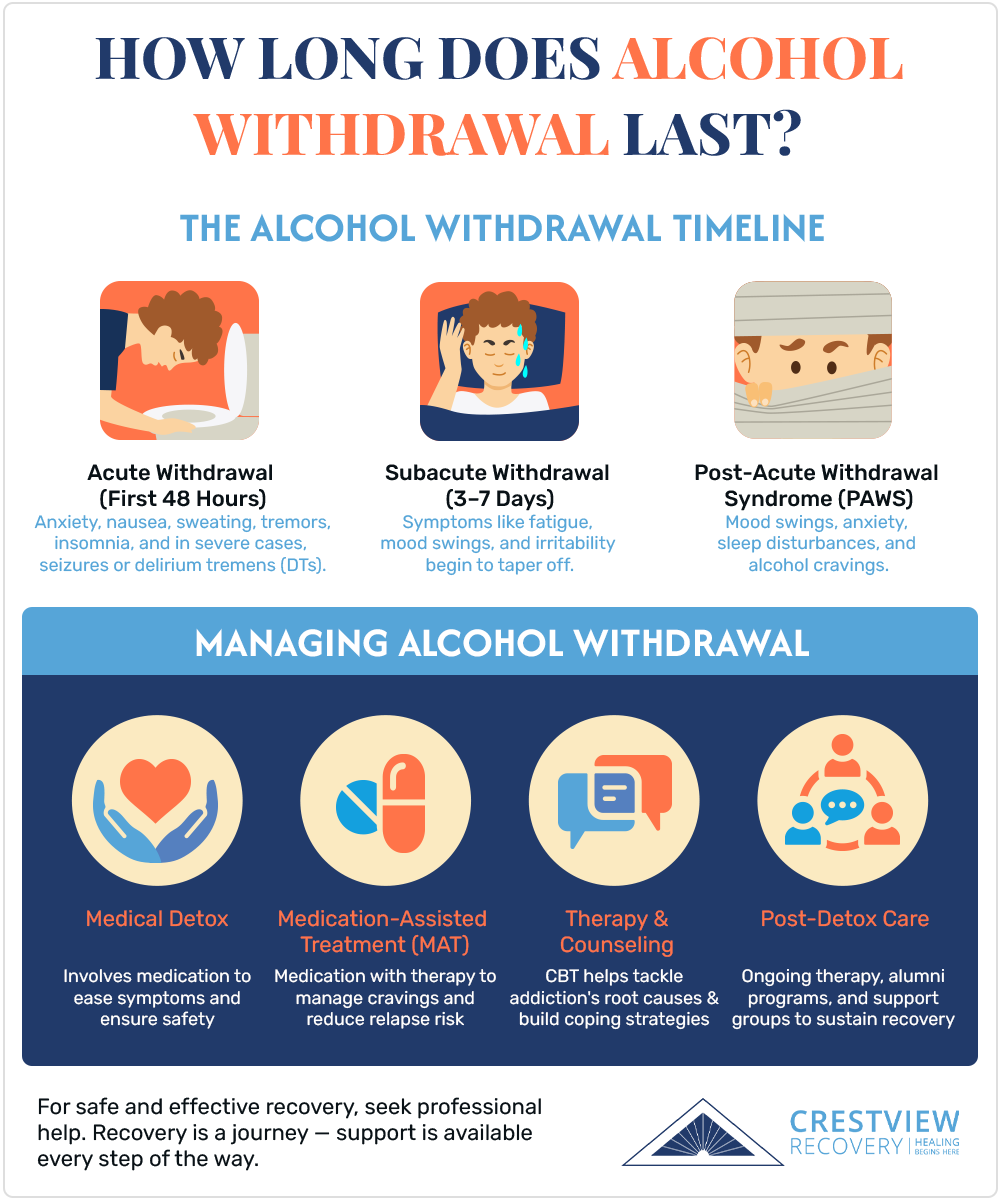At Crestview Recovery, while we do not offer detox services, we provide comprehensive residential treatment and outpatient programs for alcohol addiction recovery. Our Medication-Assisted Treatment (MAT) options are designed to help manage cravings and prevent relapse. This guide will also explore the next steps following detox and how we can support you in building a life free from alcohol dependence.
Healing Begins Here
What Happens During Alcohol Withdrawal?
During withdrawal, the body goes through a process of readjusting to functioning without alcohol. This can be uncomfortable and, in some cases, dangerous. The severity of alcohol withdrawal depends on several factors, including the duration and quantity of alcohol use, general health, and any co-occurring mental health conditions.
The stages of withdrawal typically follow a predictable pattern:

Symptoms of alcohol withdrawal can begin as early as six hours after the last drink. These early signs include anxiety, insomnia, nausea, headaches, and sweating. In more severe cases, tremors and even mild seizures can occur.
Symptoms usually peak between 24 and 72 hours after the last drink. This is the most critical stage, where withdrawal symptoms are at their most intense. Severe symptoms can include hallucinations, confusion, agitation, and seizures. Some people may develop delirium tremens (DTs), a life-threatening condition characterized by confusion, rapid heart rate, and high blood pressure.
After the peak period, symptoms start to taper off, although some individuals may experience ongoing discomfort. Mild symptoms such as fatigue, mood swings, and irritability can persist for several days.

What Are Alcohol Withdrawal Symptoms?
For many individuals, the initial stage of alcohol withdrawal produces mild symptoms. While uncomfortable, these symptoms are usually manageable but can still be distressing. They often resemble the effects of a bad hangover and may occur within just a few hours after the last drink. Common mild symptoms include:
- Anxiety: Many individuals feel heightened anxiety during alcohol withdrawal as their brain adjusts to the absence of alcohol, which previously acted as a depressant. This anxiety may range from mild restlessness to feelings of intense panic.
- Sweating: Sweating is a common physical response to the body’s attempt to stabilize its internal environment, particularly during the first 24–48 hours of withdrawal.
- Nausea: Feeling nauseous or vomiting is common in early withdrawal and is caused by both the body’s reaction to the absence of alcohol and the stress it places on the gastrointestinal system.
- Headaches: Headaches can result from dehydration and the body’s adjustment to operating without alcohol in its system.
- Insomnia: Many people experience sleep disturbances during withdrawal, making it difficult to fall or stay asleep. Alcohol impacts the brain’s neurotransmitters, and as the brain readjusts, sleep patterns can be heavily disrupted.
- Hand Tremors (Shakes): Tremors, often referred to as “the shakes,” are a hallmark of early alcohol withdrawal. Trembling or shaking in the hands is common and may worsen when anxiety levels increase.
For those with a more prolonged history of heavy drinking, symptoms may escalate beyond mild discomfort and start to affect other systems in the body. These moderate symptoms can make withdrawal more challenging and indicate that the individual may need medical intervention. Symptoms include:
- Vomiting: As withdrawal progresses, nausea can lead to persistent vomiting. This can deplete the body of essential nutrients and fluids, contributing to dehydration and other complications.
- Increased Heart Rate: Alcohol acts as a depressant on the central nervous system, so when it is suddenly removed, the body can become overstimulated, resulting in an elevated heart rate (tachycardia).
- Elevated Blood Pressure: Alcohol withdrawal can trigger high blood pressure (hypertension), which poses additional health risks, especially for individuals who already suffer from cardiovascular conditions.
- Confusion: Cognitive function can become impaired during moderate withdrawal. Many people experience difficulty thinking clearly or processing information, which can make the withdrawal process even more distressing.
- Irritability and Emotional Instability: Withdrawal affects both the body and the mind. Many individuals experience mood swings, becoming highly irritable or emotionally unstable due to the impact of alcohol on the brain’s dopamine and serotonin levels.
Severe Symptoms
In severe cases of alcohol withdrawal, symptoms can become life-threatening. Those who have been drinking heavily for long periods or have experienced multiple withdrawal episodes are at greater risk for these more dangerous symptoms. Severe symptoms require immediate medical attention and include:
- Seizures: Alcohol withdrawal seizures, also known as alcohol-induced seizures, can occur within the first 24 to 48 hours of withdrawal. These seizures are sudden, involuntary contractions of muscles throughout the body and are a medical emergency.
- Hallucinations: Some individuals may experience auditory, visual, or tactile hallucinations (seeing, hearing, or feeling things that aren’t there). This is known as alcoholic hallucinosis. Though these hallucinations can be distressing, they are typically not dangerous on their own unless accompanied by other severe symptoms.
- Delirium Tremens (DTs): Delirium tremens is one of the most severe manifestations of alcohol withdrawal and occurs in a small percentage of individuals. DTs typically appear 48–72 hours after the last drink and are characterized by sudden, severe confusion, agitation, and a rapid heartbeat. Other symptoms include extreme sweating, hallucinations, and high blood pressure. Delirium tremens can be fatal if not treated promptly.
- Severe Confusion and Disorientation: Along with the potential for hallucinations, some individuals may become extremely disoriented and confused. They may not know where they are, who they are with, or what time it is. This confusion can lead to dangerous behaviors and requires immediate intervention.
While many individuals experience mild to moderate symptoms during alcohol withdrawal, it is crucial to recognize that severe symptoms like seizures, hallucinations, and delirium tremens require emergency medical attention. These complications can be life-threatening if not properly managed.
If you or a loved one experiences any of these severe symptoms, especially seizures or confusion, seeking immediate medical help is critical. Alcohol withdrawal should never be taken lightly, and individuals at risk for severe withdrawal should detox in a medically supervised setting where they can receive the necessary care and support.
How Long Does Withdrawal Last?
Acute Withdrawal (First 48 Hours): During this period, symptoms tend to begin within 6–12 hours and escalate over the first two days. The most severe symptoms like seizures or DTs usually emerge within this timeframe.
Subacute Withdrawal (3–7 Days): After the first 48 hours, most people will experience a gradual decrease in symptoms. However, some symptoms like anxiety, irritability, and insomnia may persist.
Post-Acute Withdrawal Syndrome (PAWS): Some individuals experience prolonged withdrawal symptoms, known as Post-Acute Withdrawal Syndrome (PAWS). These symptoms include ongoing mood swings, anxiety, sleep disturbances, and cravings, and can last for weeks or even months after quitting alcohol.
Understanding this timeline can help you prepare for the different stages of withdrawal and ensure that you have the necessary support at each step.

How Is Alcohol Withdrawal Treated?
Although Crestview Recovery does not offer detox services, medical detox is the first step for many people beginning their recovery journey. This process is designed to manage and ease withdrawal symptoms through medications and close medical monitoring. Medications such as benzodiazepines may be used to reduce the risk of seizures, while other medications can help manage anxiety, nausea, and sleep disturbances.
After the initial detox, many individuals benefit from medication assisted treatment (MAT), which is something we offer at Crestview Recovery. MAT combines medication with behavioral therapy to help individuals manage alcohol cravings and reduce the risk of relapse. Medications like naltrexone, acamprosate, or disulfiram can play a vital role in long-term recovery by helping to maintain sobriety and reduce the physical and psychological urge to drink.
Behavioral therapy and counseling are critical components of treating alcohol withdrawal. At Crestview Recovery, we integrate evidence-based therapies, such as cognitive-behavioral therapy (CBT), individual counseling, and group therapy, to address the psychological aspects of alcohol addiction. Therapy helps individuals develop coping mechanisms, understand the root causes of their addiction, and build healthier, sober lives.
Next Steps After Alcohol Detox
While detox helps remove alcohol from the body, it doesn’t address the underlying issues that contribute to addiction. That’s where our residential and outpatient programs come in. At Crestview Recovery, we provide a supportive environment where you can continue to heal and grow after detox.
Residential Treatment
Our residential program is designed for individuals who need a structured, immersive environment. During residential treatment, you’ll participate in individual and group therapy sessions, attend life skills workshops, and have access to 24/7 support. We focus on holistic care, including physical health, emotional well-being, and long-term sobriety.
Outpatient Programs
For those who cannot commit to full-time residential care or have completed it, we offer flexible outpatient treatment options. Our Partial Hospitalization Program (PHP) and Intensive Outpatient Program (IOP) allow you to continue receiving therapy while maintaining your daily responsibilities. Outpatient care is an excellent option for those transitioning back into everyday life after residential treatment.
Aftercare Support
Recovery doesn’t end when you leave treatment. At Crestview Recovery, we offer aftercare support to ensure you stay connected to a sober community. This includes alumni programs, support groups, and ongoing therapy. We understand that staying sober is a lifelong commitment, and we’re here to provide the guidance and support you need at every step of your journey.
Residential Alcohol Addiction Treatment in Portland
We understand that every person’s path to recovery is unique. Our compassionate team works closely with you to create a personalized treatment plan tailored to your specific needs and goals. Whether you need support managing cravings through MAT, intensive therapy, or long-term aftercare, we are committed to helping you achieve lasting sobriety.
If you or someone you love is struggling with alcohol addiction, reach out to us today. While we don’t provide detox services, we’re here to support you with residential treatment, outpatient programs, and a range of therapeutic services to guide you through your recovery journey. Let us help you build a life free from the grip of alcohol addiction.

























